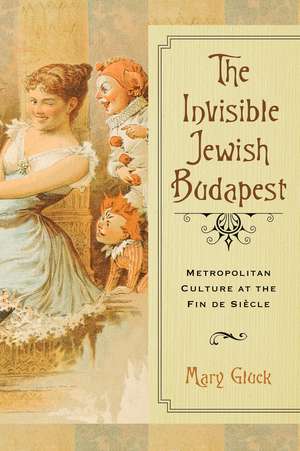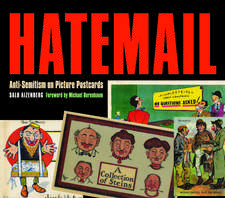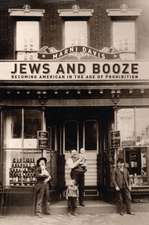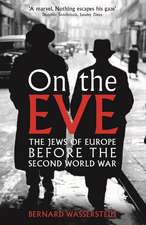The Invisible Jewish Budapest: Metropolitan Culture at the Fin de Siècle: George L. Mosse Series in the History of European Culture, Sexuality, and Ideas
Autor Mary Glucken Limba Engleză Hardback – 11 apr 2016
Nearly a quarter of the population of Budapest at the fin de siècle was Jewish. This demographic fact appears startling primarily because of its virtual absence from canonical histories of the city.
Famed for its cosmopolitan culture and vibrant nightlife, Budapest owed much to its Jewish population. Indeed, it was Jews who helped shape the city's complex urban modernity between 1867 and 1914. Yet these contributions were often unacknowledged, leading to a metaphoric, if not literal, invisible status for many of Budapest's Jews.
In the years since, particularly between the wars, anti-Semites within and outside Budapest sought to further erase Jewish influences in the city. Appellations such as the "sinful city" and "Judapest" left a toxic inheritance that often inhibited serious conversation or scholarly research on the subject.
Into this breach strides Mary Gluck, whose goal is no less than to retrieve the lost contours of Jewish Budapest. She delves into the popular culture of the city's coffee houses, music halls, and humor magazines to uncover the enormous influence of assimilated Jews in creating modernist Budapest. She explores the paradox of this culture, which was Jewish-identified yet lacked a recognizable Jewish face. Because much of the Jewish population embraced and promoted a secular, metropolitan culture, their influence as Jews was both profound and invisible.
Famed for its cosmopolitan culture and vibrant nightlife, Budapest owed much to its Jewish population. Indeed, it was Jews who helped shape the city's complex urban modernity between 1867 and 1914. Yet these contributions were often unacknowledged, leading to a metaphoric, if not literal, invisible status for many of Budapest's Jews.
In the years since, particularly between the wars, anti-Semites within and outside Budapest sought to further erase Jewish influences in the city. Appellations such as the "sinful city" and "Judapest" left a toxic inheritance that often inhibited serious conversation or scholarly research on the subject.
Into this breach strides Mary Gluck, whose goal is no less than to retrieve the lost contours of Jewish Budapest. She delves into the popular culture of the city's coffee houses, music halls, and humor magazines to uncover the enormous influence of assimilated Jews in creating modernist Budapest. She explores the paradox of this culture, which was Jewish-identified yet lacked a recognizable Jewish face. Because much of the Jewish population embraced and promoted a secular, metropolitan culture, their influence as Jews was both profound and invisible.
| Toate formatele și edițiile | Preț | Express |
|---|---|---|
| Paperback (1) | 144.97 lei 6-8 săpt. | |
| University of Wisconsin Press – 30 iul 2019 | 144.97 lei 6-8 săpt. | |
| Hardback (1) | 239.80 lei 3-5 săpt. | |
| University of Wisconsin Press – 11 apr 2016 | 239.80 lei 3-5 săpt. |
Din seria George L. Mosse Series in the History of European Culture, Sexuality, and Ideas
-
 Preț: 119.08 lei
Preț: 119.08 lei -
 Preț: 166.01 lei
Preț: 166.01 lei -
 Preț: 338.36 lei
Preț: 338.36 lei -
 Preț: 144.97 lei
Preț: 144.97 lei -
 Preț: 143.79 lei
Preț: 143.79 lei -
 Preț: 263.72 lei
Preț: 263.72 lei -
 Preț: 297.44 lei
Preț: 297.44 lei -
 Preț: 282.91 lei
Preț: 282.91 lei -
 Preț: 154.26 lei
Preț: 154.26 lei -
 Preț: 245.82 lei
Preț: 245.82 lei -
 Preț: 231.53 lei
Preț: 231.53 lei -
 Preț: 250.82 lei
Preț: 250.82 lei -
 Preț: 246.19 lei
Preț: 246.19 lei -
 Preț: 306.34 lei
Preț: 306.34 lei -
 Preț: 305.89 lei
Preț: 305.89 lei -
 Preț: 132.03 lei
Preț: 132.03 lei -
 Preț: 279.45 lei
Preț: 279.45 lei -
 Preț: 181.22 lei
Preț: 181.22 lei -
 Preț: 189.95 lei
Preț: 189.95 lei -
 Preț: 251.23 lei
Preț: 251.23 lei -
 Preț: 190.51 lei
Preț: 190.51 lei -
 Preț: 314.03 lei
Preț: 314.03 lei - 23%
 Preț: 473.13 lei
Preț: 473.13 lei -
 Preț: 315.18 lei
Preț: 315.18 lei - 23%
 Preț: 482.44 lei
Preț: 482.44 lei - 8%
 Preț: 462.20 lei
Preț: 462.20 lei - 23%
 Preț: 482.60 lei
Preț: 482.60 lei - 19%
 Preț: 433.43 lei
Preț: 433.43 lei - 19%
 Preț: 432.54 lei
Preț: 432.54 lei -

Preț: 239.80 lei
Nou
Puncte Express: 360
Preț estimativ în valută:
45.89€ • 47.64$ • 38.27£
45.89€ • 47.64$ • 38.27£
Carte disponibilă
Livrare economică 01-15 martie
Preluare comenzi: 021 569.72.76
Specificații
ISBN-13: 9780299307707
ISBN-10: 0299307700
Pagini: 240
Ilustrații: 40 b-w illus.
Dimensiuni: 152 x 229 x 28 mm
Greutate: 0.5 kg
Ediția:1
Editura: University of Wisconsin Press
Colecția University of Wisconsin Press
Seria George L. Mosse Series in the History of European Culture, Sexuality, and Ideas
ISBN-10: 0299307700
Pagini: 240
Ilustrații: 40 b-w illus.
Dimensiuni: 152 x 229 x 28 mm
Greutate: 0.5 kg
Ediția:1
Editura: University of Wisconsin Press
Colecția University of Wisconsin Press
Seria George L. Mosse Series in the History of European Culture, Sexuality, and Ideas
Recenzii
"A magnificently consequential book. Gluck examines the vibrant modernist culture created largely by secular Jews in Budapest, in counterpoint to a backward-looking, nationalistic Hungarian establishment and a conservative Jewish religious elite."—Scott Spector, author of Violent Sensations: Sex, Crime, and Utopia in Vienna and Berlin, 1860–1914 —Scott Spector,author of Violent Sensations: Sex, Crime, and Utopia in Vienna and Berlin, 1860–1914
"Gluck's argument is so brilliant, perceptive, and clear that one can forget what a radical challenge it is to received opinion." —Steven Beller,editor of Rethinking Vienna 1900
"Both scholarly and entertaining."
—Jewish Currents
—Jewish Currents
Notă biografică
Mary Gluck is a professor of history and Judaic studies at Brown University. She is the author of Georg Lukács and His Generation, 1900–1918 and Popular Bohemia: Modernism and Urban Culture in Nineteenth-Century Paris.
Cuprins
List of Illustrations
Acknowledgments
Introduction: Jewish Budapest as a Symbolic Space
1 Cultural Visions of the Emerging City
2 The Jewish Question and the Paradox of Hungarian Liberalism
3 A Jewish Politician in a Divided Public Space
4 The Jewish Humor Magazine and Collective Self-Parody
5 The Scandal of the Budapest Orpheum
6 Critical Cross-Dressing and Jewish Bourgeois Identity
Epilogue: The Waning of Jewish Budapest after World War I
Notes
Index
Acknowledgments
Introduction: Jewish Budapest as a Symbolic Space
1 Cultural Visions of the Emerging City
2 The Jewish Question and the Paradox of Hungarian Liberalism
3 A Jewish Politician in a Divided Public Space
4 The Jewish Humor Magazine and Collective Self-Parody
5 The Scandal of the Budapest Orpheum
6 Critical Cross-Dressing and Jewish Bourgeois Identity
Epilogue: The Waning of Jewish Budapest after World War I
Notes
Index
Descriere
A groundbreaking, brilliant urban history of a vibrant Central European metropolis—Budapest—and of its now-forgotten assimilated Jews, who largely created its modernist culture in the decades before World War I.














